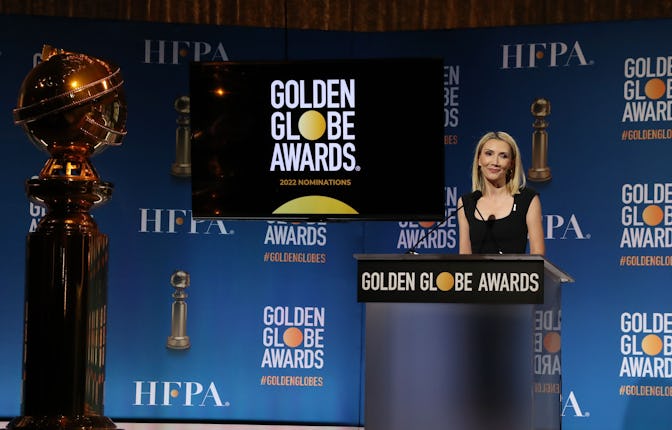The Golden Globes show who has the real power in cancel culture
Hint: it’s not the “Twitter mobs.”

In 1944, the newly formed Hollywood Foreign Press Association, a collection of foreign journalists in Los Angeles, held the first ever Golden Globe Awards at the 20th Century Fox studios. The HFPA hoped to publicize quality cinema to a global audience at a time when the entire world was at war. In the nearly eight decades since, the awards ceremony has grown into one of the most prestigious and powerful signifiers of esteemed work in the industry, taking place, without fail, every year. In 2008, amid the Hollywood writers’ strike, the Globes pressed on even as a televised press conference. Last year, it took place amid an ongoing global pandemic.
This year the HFPA pushed ahead once again, but the ceremony has never faced a greater existential threat — from the celebrities and studios themselves that it lauds annually. The 79th Annual Golden Globe Awards came and went on Sunday, unexpectedly to most because it took place practically in the dark. A quiet affair at the Beverly Hilton, the event was not televised nor live-streamed, and occurred without any celebrities in attendance.
It’s a harsh outcome that was forecasted — by last summer, NBC had pulled the plug on televising the event, and streamers, studios, and publicists and their A-list stars had said they would boycott the event — after the HFPA faced serious backlash throughout 2021 over its lack of inclusion and diversity among its ranks, along with its dubious practices as an organization and in its awarding processes. It is also among the clearest examples of how influence truly operates in entertainment and who really determines the arc of so-called cancel culture.
For an event as enduring and prodigious as the Globes — broadcasted in some 167 countries, it consistently ranks as the third single most-watched event in the world every year, behind only the Oscars and the Grammys — to be all but completely shut down within months of facing criticism is an unprecedented show of the sway of celebrities and industry shot-callers. Those select few are the ones who truly determine what will be burned down when it comes to the major figures and institutions, even for something as historic as the Golden Globes. True power, in other words, belongs to those, of course, in power.
The entire debacle most decisively clarifies the debate around cancel culture gone rampant when juxtaposed against the nearly identical, but even bigger, controversy of #OscarsSoWhite movement. Both are rooted in outrage over lopsided representation, but the former was driven almost solely by online ire.
In that case, the outcome in the years since — even as the Oscars have persistently faced criticism for failing to deliver on its promise of being a more inclusive affair — has never actually faced serious threats of extinction. Instead, it followed, more or less, the well-tread procedure for most institutions facing criticism: backlash, followed by a hurried and hollow response about making changes, followed by a somewhat cheap set of cosmetic alterations, and finally a quiet return to the status quo as the sour taste of controversy fades.
The Globes, though, may actually be done away with and has reached this point seemingly in the blink of an eye because industry insiders decided things should be as such. Granted, the Oscars are much bigger and times have also changed — the OscarsSoWhite backlash occurred in 2015 and is perhaps the singular defining event that, in fact, sparked the culture wars that introduced the very idea of being cancelled. One could not reasonably expect a drastic response back then from a culture that hadn’t existed yet to force meaningful change. In that sense, the Globes situation is also a positive sign of how different the tone and urgency are around notions of representational politics.
And yet, it is possible, even plausible, for the Globes to return to near full-form next year (NBC has said it would be open to television the event in 2023, given the HFPA proves to have made real change) — but only if and when those in power determine that their repentance and new look, substantive or not, are sufficient. Just don’t expect the anger from Twitter to matter much when it does.